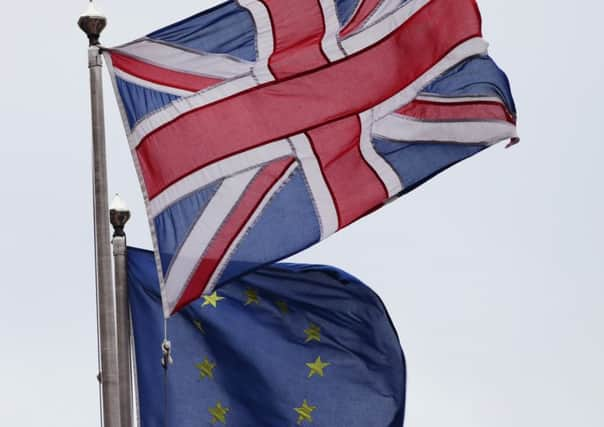Ben Lowry: UK has plunged deep into uncharted waters


It is the biggest upheaval in the United Kingdom since the Second World War.
A nation that is famed for its small ‘c’ conservatism has repudiated the status quo, indeed shattered it, and plunged the nation deep into uncharted waters.
Advertisement
Hide AdAdvertisement
Hide AdThe very future of the European Union is now in peril, with other Eurosceptic EU countries almost certain to demand their own referendum.
The ramifications for the United Kingdom are unknowable, and probably huge.
One of the most dramatic aspects of the vote is the utter gulf between England and Scotland.
Whereas the overall UK vote was relatively close, at 16,911,138 for Leave (51.7%) to 15,776,916 for Remain (48.3%), the results in those two countries were not close.
Advertisement
Hide AdAdvertisement
Hide AdThe former voted decisively to quit: 14,688,802 for Leave (53.2%) against 12,902,671 for Remain (46.8%).
The latter voted overwhelmingly to stay: 1,018,322 for Leave (38.0%) against 1,661,191 for Remain (62.0%).
That is such a stark contrast in outlook between the two countries that it was no surprise to hear the Scottish nationalists immediately talking about at a second referendum.
Northern Ireland has surprised all observers by only backing Remain by a relatively narrow margin 440,437 (55.8%) to 349,442 (44.2%), when months ago it had seemed the Province would be overwhelmingly Remain.
Advertisement
Hide AdAdvertisement
Hide AdBut turnout was clearly much lower in nationalist areas than in unionist ones. They were not engaged in this referendum.
Now their reaction to being turfed out of the European Union will be closely scrutinised.
The implications of yesterday’s vote will take time to sink in for us all.
The most notable change will be for holiday makers: no European Union passports, with their distinctive EU lettering on the cover, and no right to go through the immigration control queues that such passport holders use.
Advertisement
Hide AdAdvertisement
Hide AdBut there will be many other personal uncertainties for us as former EU citizens, such as the residency and welfare entitlements of Britons who retire to EU countries.
Here in Northern Ireland the border and what will become of it will be in the spotlight for years to come, until complex London-Dublin-EU negotiations are completed well into the future.
But the Irish border will be a minor sideshow in the huge, coming recalibrating of trade and legal relations between Britain and Europe.
It is no surprise David Cameron’s career is at an end, even though he will front up the government for some more months. As a highly polished politician, that is a major loss to the Conservative Party.
Advertisement
Hide AdAdvertisement
Hide AdIt is hard to see an alternative to Boris Johnson as prime minister - his judgement of the national mood has been vindicated.
The same can be said of Michael Gove, who is highly intelligent but who does not have the personality of Mr Johnson.
Most of us who report and commentate on events can look back on the referendum campaign and pinpoint some of the signals that indicated that support for Brexit might be more widespread than we had first realised.
One such moment for me came when two people whom I know very well and who are lifelong Alliance voters said that they were undecided as to how to vote.
Undecided? was my reaction. Even you?!.
Advertisement
Hide AdAdvertisement
Hide AdBy the end of the campaign I had met many more such people who surprised me as possible Brexit voters.
In recent weeks the drift within unionism towards Brexit became evident, with growing numbers of Ulster Unionist politicians declaring for it, putting them out of step with their party leader Mike Nesbitt.
The big clue as to what was happening in Great Britain came last year in the general election.
Ukip got 14% of the vote, which was a vast total, yet this did not damage the Tories, as had been the conventional wisdom. It had been assumed that a Ukip rise would come from Tory voters. Instead it was Labour if anything that was more hit by the surge in support for Nigel Farage’s party.
Advertisement
Hide AdAdvertisement
Hide AdLast night it became clear that a vast Brexit vote in Labour heartlands had swung it for the Leave campaign.
Many pundits watching the early results clearly failed to appreciate the significance of the Sunderland result. It had been flagged up as a seat where anything more than a 6-point margin for Brexit would be a good result for Leave. In the event it was a 22-point lead.
Kate Hoey, the Ulster-born staunchly unionist Labour MP, is shown to have been far more in tune with her party’s grassroots than the Labour leadership.
Ben Lowry (@BenLowry2) is News Letter deputy editor